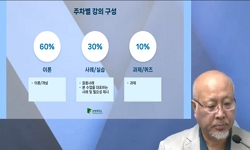아시아 각국에서 급성장한 대중음악 페스티벌은 20년 동안 음악, 공연, 관광을 아우르는 새로운 문화형태로 자리 잡았고 도시개발 등 다른 분야에서도 독특한 역할을 하고 있다. 그리고 음반...
http://chineseinput.net/에서 pinyin(병음)방식으로 중국어를 변환할 수 있습니다.
변환된 중국어를 복사하여 사용하시면 됩니다.
- 中文 을 입력하시려면 zhongwen을 입력하시고 space를누르시면됩니다.
- 北京 을 입력하시려면 beijing을 입력하시고 space를 누르시면 됩니다.
https://www.riss.kr/link?id=T16420933
- 저자
-
발행사항
서울 : 중앙대학교 대학원, 2022
-
학위논문사항
학위논문(석사) -- 중앙대학교 대학원 , 문화예술경영학과 공연경영전공 , 2022. 8
-
발행연도
2022
-
작성언어
한국어
- 주제어
-
발행국(도시)
서울
-
기타서명
(The) effect of the brand equity of a popular music festival on the revisit intention : based on the extended planned behavior theory (ETPB)
-
형태사항
iv, 97 p. : 삽화, 도표 ; 26 cm
-
일반주기명
중앙대학교 논문은 저작권에 의해 보호받습니다
지도교수: 권혁인, 김대진
참고문헌수록 -
UCI식별코드
I804:11052-000000237191
- DOI식별코드
- 소장기관
-
0
상세조회 -
0
다운로드
부가정보
국문 초록 (Abstract)
그러나 한국뿐만 아니라 중국에서도 음악 페스티벌 산업이 커지면서 동질화와 신생 페스티벌들이 지속적으로 개최하지 못하는 문제가 심각해지고 있다. 한국에서 음악 페스티벌은 지역축제에 의존하고 있는 반면에 중국 음악 페스티벌이 이미 고도의 시장화와 상품화된 문화 소비재로서 브랜드화가 시작됐다. 이러한 같은 발전 시기에 있는 두 모델 중에 첫 번째 모델에 대한 연구는 많이 진행되었지만 두 번째에 대한 검토는 아직 미흡하다. 따라서 본 연구는 중국에서 가장 대표성 있는 대중음악 페스티벌 대상으로 그의 브랜드 전략을 분석하고 브랜드 자산이 어떻게 고객의 소비 과정에 영향을 미치는지를 탐구하고 다른 대중음악 페스티벌에 브랜드화 방안을 제시하여 발전 방향을 밝혀주는 목적으로 연구를 진행하였다. 그리고 선행연구와 이론 배경을 검토한 후 브랜드 자산 개념과 계획행동이론 모델을 활용하여 연구의 변수를 확정하고, 실증분석을 통해 대중음악 페스티벌의 브랜드 자산, 계획행동요인과 재방문 의도 간의 인과관계를 탐색하는 연구 모형을 구축하였다.
설문조사를 진행한 후에 수집된 표본으로 측정 도구의 타당성과 신뢰성을 확인하고 구조방정식 모델을 통해 모형의 적합도와 유의성을 검정하였다. 분석 결과를 살펴보면 브랜드 자산인 브랜드 이미지, 브랜드 충성도는 태도에 긍정적 영향을 미치고 태도와 주관적 규범은 재방문 의도에 긍정적인 영향을 주는 것으로 확인하며 개최도시는 일부의 브랜드 자산과 태도에 유의적인 조절효과가 나타난다.
마지막으로 연구결과를 통해 대중음악 페스티벌의 브랜드화 경영전략을 도출하였으며 지속적으로 개최하는 방안을 실행하기 위해 실무적인 시사점을 제공하였다. 그리고 연구 과정에서의 부족함을 설명하고 후속 연구의 방향을 제시하였다.
아시아 각국에서 급성장한 대중음악 페스티벌은 20년 동안 음악, 공연, 관광을 아우르는 새로운 문화형태로 자리 잡았고 도시개발 등 다른 분야에서도 독특한 역할을 하고 있다. 그리고 음반산업의 몰락에 따라 음악 페스티벌 공연은 대중음악과 아티스트에게 새로운 발전공간을 마련해 준다. 음악 페스티벌은 소비 진작과 문화생활의 풍요로움, 문화산업 간 융합과 문화교류 가속화 등에서 지속 가능한 성장 잠재력을 보여주고 있다.
그러나 한국뿐만 아니라 중국에서도 음악 페스티벌 산업이 커지면서 동질화와 신생 페스티벌들이 지속적으로 개최하지 못하는 문제가 심각해지고 있다. 한국에서 음악 페스티벌은 지역축제에 의존하고 있는 반면에 중국 음악 페스티벌이 이미 고도의 시장화와 상품화된 문화 소비재로서 브랜드화가 시작됐다. 이러한 같은 발전 시기에 있는 두 모델 중에 첫 번째 모델에 대한 연구는 많이 진행되었지만 두 번째에 대한 검토는 아직 미흡하다. 따라서 본 연구는 중국에서 가장 대표성 있는 대중음악 페스티벌 대상으로 그의 브랜드 전략을 분석하고 브랜드 자산이 어떻게 고객의 소비 과정에 영향을 미치는지를 탐구하고 다른 대중음악 페스티벌에 브랜드화 방안을 제시하여 발전 방향을 밝혀주는 목적으로 연구를 진행하였다. 그리고 선행연구와 이론 배경을 검토한 후 브랜드 자산 개념과 계획행동이론 모델을 활용하여 연구의 변수를 확정하고, 실증분석을 통해 대중음악 페스티벌의 브랜드 자산, 계획행동요인과 재방문 의도 간의 인과관계를 탐색하는 연구 모형을 구축하였다.
설문조사를 진행한 후에 수집된 표본으로 측정 도구의 타당성과 신뢰성을 확인하고 구조방정식 모델을 통해 모형의 적합도와 유의성을 검정하였다. 분석 결과를 살펴보면 브랜드 자산인 브랜드 이미지, 브랜드 충성도는 태도에 긍정적 영향을 미치고 태도와 주관적 규범은 재방문 의도에 긍정적인 영향을 주는 것으로 확인하며 개최도시는 일부의 브랜드 자산과 태도에 유의적인 조절효과가 나타난다.
마지막으로 연구결과를 통해 대중음악 페스티벌의 브랜드화 경영전략을 도출하였으며 지속적으로 개최하는 방안을 실행하기 위해 실무적인 시사점을 제공하였다. 그리고 연구 과정에서의 부족함을 설명하고 후속 연구의 방향을 제시하였다.
다국어 초록 (Multilingual Abstract)
The problems of homogenization and the unsustainable holding of new-born festivals are becoming more and more serious, not only in the expansion of the music festival industry in Korea and China, In Korea, music festivals depend on regional celebrations, while Chinese Music Festivals, as highly marketable and commoditized cultural consumer goods, have begun to be branded. Among the two models in the same development period, although much research has been done on the first model, the research on the second model is far from enough. Hence this research took the most representative Pop Music Festival in China as the object, analyzed its Brand Strategy, explored how various Brand Equity affect the Customers' Consumption Process, and proposed branding plans to other Popular Music Festivals to clarify the development direction. After reviewing the previous research and theoretical background, the variables of the study were confirmed by using the Brand Equity concept and the Planned Behavior Theory Model, through the empirical analysis, a research model was constructed to explore the causal relationship between the Brand Equity of Popular Music Festivals, Planned Action Factors, and Revisit Intentions.
After conducting a questionnaire survey, the collected specimens were used to confirm the validity and reliability of the measurement tools, and the joint degree and significance of the model were identified through structural equation modeling. From the analysis results, Brand Image and Brand Loyalty have a positive impact on Attitude, Attitude and Subjective Norm have a positive impact on Revisit Intention, and the host city has a significant moderating effect on Brand Equity and Attitude.
Finally, according to the research results, a management strategy for branding a Pop Music Festival was derived, and practical implications were provided to implement a plan to hold it continuously. In addition, deficiencies in the research process were explained and directions for follow-up studies were suggested.
Pop Music Festivals have developed rapidly in Asian countries in just 20 years, and have become a new cultural form integrating music, performances and sightseeing. Pop Music Festivals has a unique role in other fields such as urban development. With ...
Pop Music Festivals have developed rapidly in Asian countries in just 20 years, and have become a new cultural form integrating music, performances and sightseeing. Pop Music Festivals has a unique role in other fields such as urban development. With the decline of the record industry, Music Festival performances have provided new development space for Pop Music and Popular musicians. The rapid growth of Music Festivals has shown sustainable development potential in stimulating consumption, enriching people's cultural life, and accelerating the integration of cultural industries and cultural exchanges.
The problems of homogenization and the unsustainable holding of new-born festivals are becoming more and more serious, not only in the expansion of the music festival industry in Korea and China, In Korea, music festivals depend on regional celebrations, while Chinese Music Festivals, as highly marketable and commoditized cultural consumer goods, have begun to be branded. Among the two models in the same development period, although much research has been done on the first model, the research on the second model is far from enough. Hence this research took the most representative Pop Music Festival in China as the object, analyzed its Brand Strategy, explored how various Brand Equity affect the Customers' Consumption Process, and proposed branding plans to other Popular Music Festivals to clarify the development direction. After reviewing the previous research and theoretical background, the variables of the study were confirmed by using the Brand Equity concept and the Planned Behavior Theory Model, through the empirical analysis, a research model was constructed to explore the causal relationship between the Brand Equity of Popular Music Festivals, Planned Action Factors, and Revisit Intentions.
After conducting a questionnaire survey, the collected specimens were used to confirm the validity and reliability of the measurement tools, and the joint degree and significance of the model were identified through structural equation modeling. From the analysis results, Brand Image and Brand Loyalty have a positive impact on Attitude, Attitude and Subjective Norm have a positive impact on Revisit Intention, and the host city has a significant moderating effect on Brand Equity and Attitude.
Finally, according to the research results, a management strategy for branding a Pop Music Festival was derived, and practical implications were provided to implement a plan to hold it continuously. In addition, deficiencies in the research process were explained and directions for follow-up studies were suggested.
목차 (Table of Contents)
- 제1장 서론 1
- 제1절 연구목적 및 필요성 1
- 제2절 연구의 구성 4
- 제2장 이론적 고찰 및 선행연구 6
- 제1절 대중음악 페스티벌의 역사 및 현황 7
- 제1장 서론 1
- 제1절 연구목적 및 필요성 1
- 제2절 연구의 구성 4
- 제2장 이론적 고찰 및 선행연구 6
- 제1절 대중음악 페스티벌의 역사 및 현황 7
- 1. 대중음악 페스티벌의 개념 7
- 2. 대중음악 페스티벌의 역사 8
- 3. 대중음악 페스티벌의 현황 10
- 제2절 브랜드 자산에 관한 선행연구 14
- 1. 브랜드 자산의 개요 14
- 2. 브랜드 자산의 현황 15
- 3. 브랜드 자산의 구성요소 18
- 제3절 계획행동이론에 관한 선행연구 20
- 1. 계획행동이론의 개요 20
- 2. 계획행동이론의 현황 21
- 제3장 연구 설계 및 방법 23
- 제1절 연구 모형 및 가설 설정 23
- 제2절 변수의 조작적 정의 및 측정 방법 30
- 제3절 자료수집 및 분석방법 34
- 제4장 연구 분석 및 결과 36
- 제1절 표본의 인구통계학적 특성 36
- 제2절 표본의 방문특성 38
- 제3절 측정 도구의 타당도 및 신뢰도 검증 41
- 1. 측정 도구의 탐색적 요인분석 41
- 2. 측정 도구의 신뢰도 분석 44
- 3. 연구 모형 확인적 요인분석 45
- 4. 구성개념의 판별타당성 49
- 제4절 가설 검정 및 분석 결과 50
- 1. 연구 모형의 적합도 검증 50
- 2. 연구 모형에 대한 가설 검정 및 결과 해석 50
- 3. 조절 효과 검증 52
- 제5장 결론 56
- 제1절 연구 결과 요약 56
- 제2절 연구의 시사점 및 한계점 60
- 참고문헌 63
- 부 록 81
- 국문초록 93
- Abstract 95












